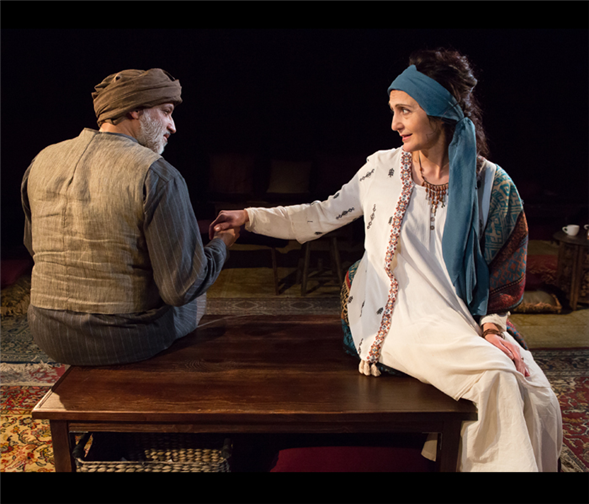Translate Page

A new play upends a classic work of art
---That's not who arrives, however. Instead, we meet a woman named Umm, and she promises to tell a story of intrigue and danger. It's set in French Algeria in the early 1900s, and the mystery is which one of her three sons will be shot by a Frenchman.
Umm's story is an intentional response to Albert Camus' novel The Stranger, in which a Frenchman living in Algeria shoots an unnamed Arab on a beach and then feels no remorse.
Shamieh, whose parents are from Palestine, recalls reading the book in high school. "I didn't really get into it," she says. "Everyone talks about it being an existential novel about one guy killing another guy and not feeling anything, without really contextualizing that they're colonialists and he kills an Algerian in a country where the Algerians didn't have the right to vote."
To be specific, the French colonized Algeria from 1830 to 1962, subjugating native Algerians in the process. "Their movement was restricted and they needed permission to move from one area to another," Shamieh says. "They were considered semi-human, and in order to live side by side with people who are being treated as semi-human, you have to kind of desensitize yourself. So it makes sense to me that the natural extension of that might lead to violence and murder."
Upon rereading the novel in adulthood, Shamieh discovered an aspect she had missed the first time: the unnamed Arab had a reason for being on the beach. He was defending the honor of an Arab woman who was beaten and raped by a Frenchman. The playwright found those gender politics fascinating, so she set out to expand on that backstory.
In The Strangest, the unnamed Arab is given a name (which won't be disclosed here to avoid spoilers). He and his two brothers are in love with the ambitious Layali, who longs for a life beyond poverty. Director May Adrales, who has been with the project from the beginning, was attracted by this alternative viewpoint. "The fact that [Betty] was taking an unnamed character in The Stranger and telling it from the point of view of the dead man's mother," she says. "I just love stories like that -- that reimagine and reshape our assumptions about a mainstream text or history."
{Image1}
And for the team of The Strangest, that also meant taking audiences out of the typical Western theatregoing experience. The set is meant to evoke a traditional Middle Eastern storytelling cafe, where men would tell stories to rapt audiences drinking coffee. "There's a whole oral storytelling tradition that predates Shakespeare in the Middle Eastern culture," Shamieh says. "They do it in coffee houses. They have poetry duels which is basically poetry slams. During the time of the Crusades, they did that."
However, The Strangest isn't a completely traditional storytelling experience. After all, the cast numbers seven, and women are doing the talking. "What's really interesting is the stories [that the male storytellers in cafes] most often told were from the Arabian Nights, and the most famous storyteller in the Middle East is Scheherazade," Shamieh says. "So how weird would it be to be telling stories about women storytellers and not allowing women to be storytellers?" Umm even notes this inequality in the play.
This adds a complication to the narrative of The Strangest. The play is not only about the French oppressing Algerians, but also about men oppressing women. That is why for Shamieh, the play is less about French Algeria than colonialism anywhere and the layers of subjugation within any society.
"I have a complicated worldview," she says. "I think part of human nature is that we all have the capacity to oppress other people. I think there's something human we have to look at in all people, whether it's in families or in countries or in any situation. I think it's a human flaw, and we have to recognize and work on it, rather than say, 'it's this kind of person.' I wanted to create a complicated story about people and the need to oppress, where it comes from, and how one fights it."
---
Follow Diep Tran at @DiepThought. Follow TDF at @TDFNYC.
Photos by Hunter Canning Photography. Top photo: Alok Tewari and Jacqueline Antaramian.
TDF Members: Go here to browse our discounts for theatre, dance, and concerts.